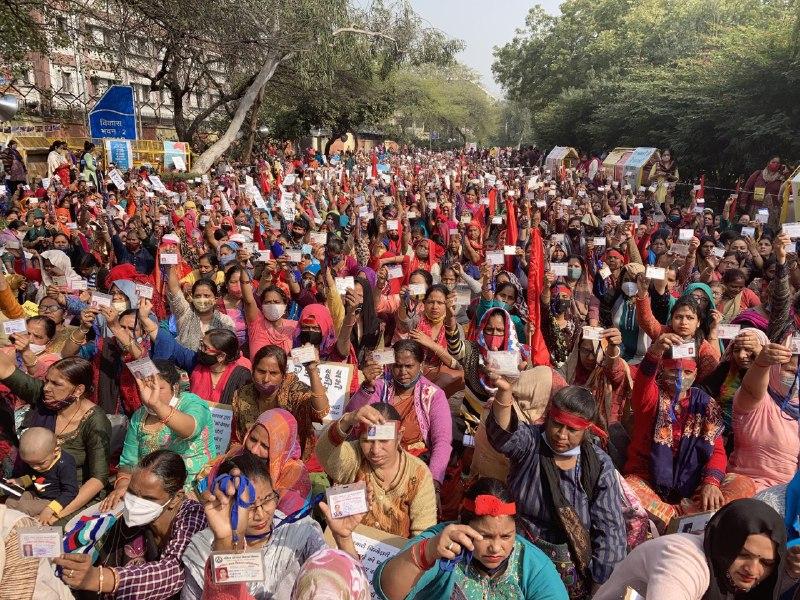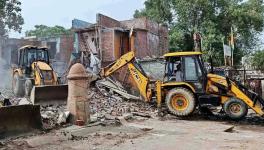Striking Anganwadi Workers to Counter AAP’s ‘Delhi Model’ Pitch in Poll-Bound States

Striking anganwadi workers and helpers showcase their ID cards on Tuesday. Image clicked by Ronak Chhabra
New Delhi: Anganwadi workers and helpers, who have been on strike since nine days in the national capital, announced on Tuesday that they will expose the “hypocrisy and double talk” of the Arvind Kejriwal-led Delhi government by visiting poll-bound states in the days to come.
The announcement has come at a time when Aam Aadmi Party (AAP) seeks to take its ‘Delhi model’ of governance pitch to Punjab, Uttarakhand, Goa, and Uttar Pradesh in a bid to woo voters. Assembly elections in these four states, along with Manipur, are slated to begin later this month.
“We will expose the hypocrisy and double talk of Kejriwal by sending our teams to states where AAP is invoking its ‘Delhi model’ of governance to seek votes,” Shivani Kaul, president, Delhi State Anganwadi Workers and Helpers Union (DSAWHU), said in a press conference on Tuesday. She added one team, comprising four to five women, has already reached Goa and will begin their campaign in cities, including Margao and Vasco Da Gama.
“Another team of 30 to 35 women will leave tomorrow for Punjab. In our first round of campaign there, we will visit parts of Mansa district. In the coming days, we will also campaign in Ludhiana, Bhatinda, and Sangrur,” Kaul said, while addressing the media.
Eyeing municipal corporation polls in Delhi, that are slated to be held later in April this year, the striking workers and helpers will also initiate a campaign against AAP in several localities from Wednesday, DSAWHU said. On Tuesday, the union also announced a rally around their protest site on Friday, February 11.
Thousands of anganwadi workers and helpers are staying put near Delhi CM Kejriwal’s residence here in the national capital since over a week now as part of their city-wide work strike to demand, above all, an increment in the honorarium of the all-women workforce. The protesting women also flayed the Central government for not ensuring payment of an increase in remuneration announced by Prime Minister Narendra Modi in 2018.
At the press conference held at the protest site outside Vikas Bhawan in Civil Lines, the striking workers and helpers said they will visit the poll-bound wtates and “debunk the tall claims,” being made by Kejriwal. In December last year, the latter, while meeting anganwadi and ASHA workers of Punjab, had promised to double their pay if his party was voted to power in the State in the upcoming Assembly polls.
Likewise, in Goa, AAP reportedly extended support to the anganwadi workers there who went on strike last year demanding better pay and other facilities.
Such gestures, that may successfully attract potential voters, however, haven’t gone down well with the aggrieved anganwadi caregivers in Delhi who, citing “tremendous” surge in prices of essential items and increase in workload, are demanding a pay of Rs. 25,000 and Rs. 20,000 for workers and helpers, respectively.
Currently, in Delhi, anganwadi workers and helpers, while bereft of “employee” status, are entitled to Rs 9,698 and Rs 4,839, respectively.
As part of the anganwadi services, as envisaged under the Integrated Child Development Scheme (ICDS), the regular responsibilities of caregivers include providing nutrition supplements and other development help to children under six years of age as well as to pregnant and lactating mothers.
There are above 10,000 government-run day care centres under ICDS-administered anganwadi scheme, which caters to over one lakh children and women in Delhi. The total strength of the anganwadi workers and helpers in these centres currently stands at around 22,000.
However, during the pandemic, these community caregivers played a crucial role – while imparting their regular duties – in arresting the spread of COVID-19, that many women now lament largely went unrecognised.
“We are required to maintain as many as 24 registers on a daily basis. During the time of COVID, we also maintained data relating to vaccination in our communities. We also distributed dry ration door-to-door every month in this period,” said Rajni Saini, 38, an anganwadi caregiver in North Delhi’s Alipur project, on Tuesday.
Sunita Kaushik, another anganwadi caregiver, rued that far from being given compensation for the work done, the workers and helpers were not even provided with masks and sanitisers, face covers, among others.
The striking union also alleged that the women participating in the strike action were being threatened by the officials of Delhi’s Department of Women and Child Development (WCD) to resume their duties or face mass termination.
An official of the WCD department was not immediately available to comment over these allegations. An email sent by Newsclick to the department also did not elicit any response till the publication of this report. This article will be updated when they respond.
“The Delhi government must know that the [anganwadi] workers and helpers on strike won’t feel threatened by such warnings. The strike will continue until the government agrees to talk to our union,” Kaul of DSAWHU said, adding that they were prepared to “go on like this for the next six months.”
Meanwhile, on Monday, another union of anganwadi workers and helpers in the city announced intensification of the struggle by giving a call to protest outside Delhi Secretariat on Friday, February 11. “We demand that a minimum wage of Rs. 26,000 must be implemented for the anganwadi workers,” said the CITU-affiliated Delhi Anganwadi Workers and Helpers Union (DAWHU).
Get the latest reports & analysis with people's perspective on Protests, movements & deep analytical videos, discussions of the current affairs in your Telegram app. Subscribe to NewsClick's Telegram channel & get Real-Time updates on stories, as they get published on our website.
























